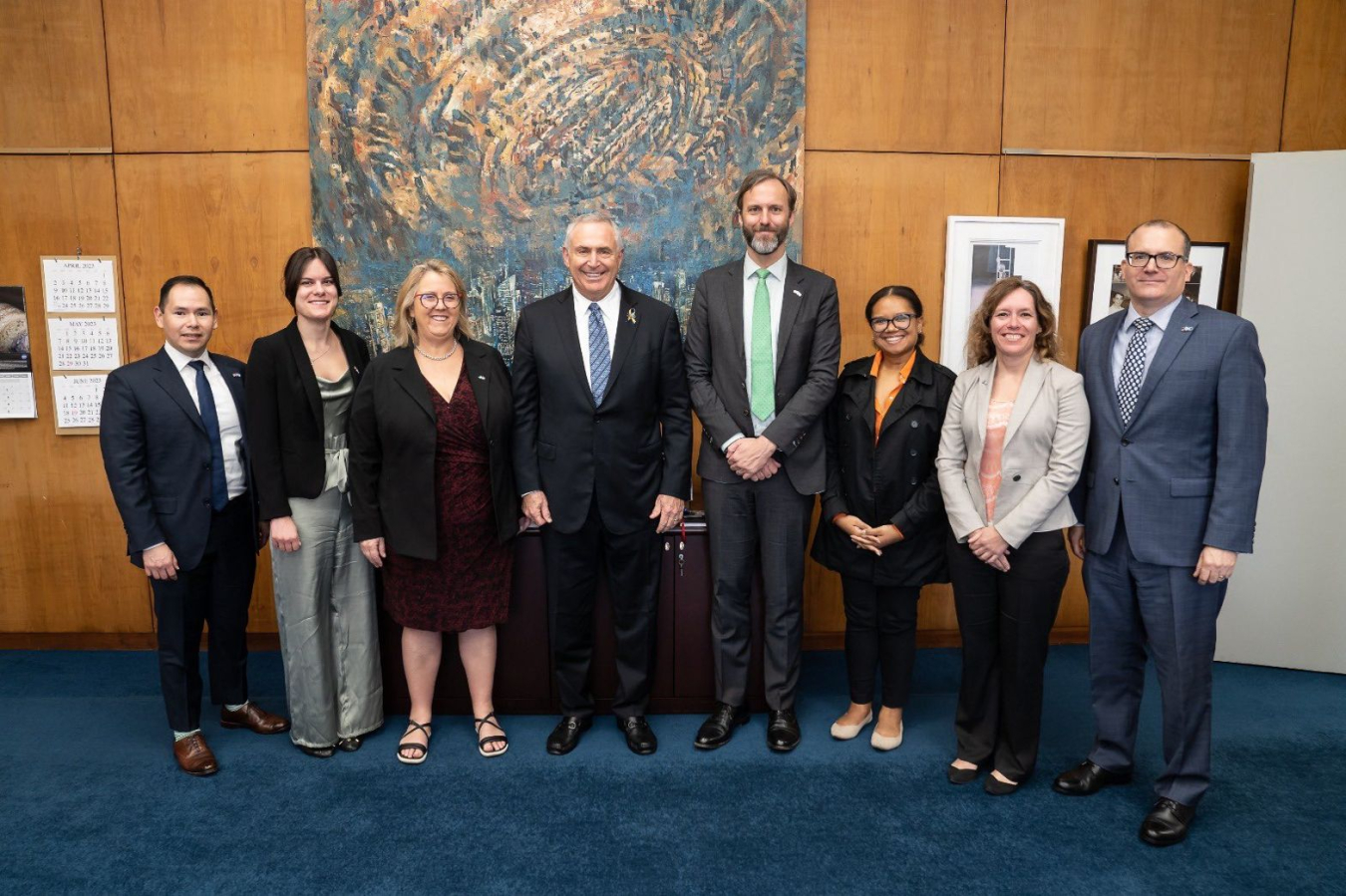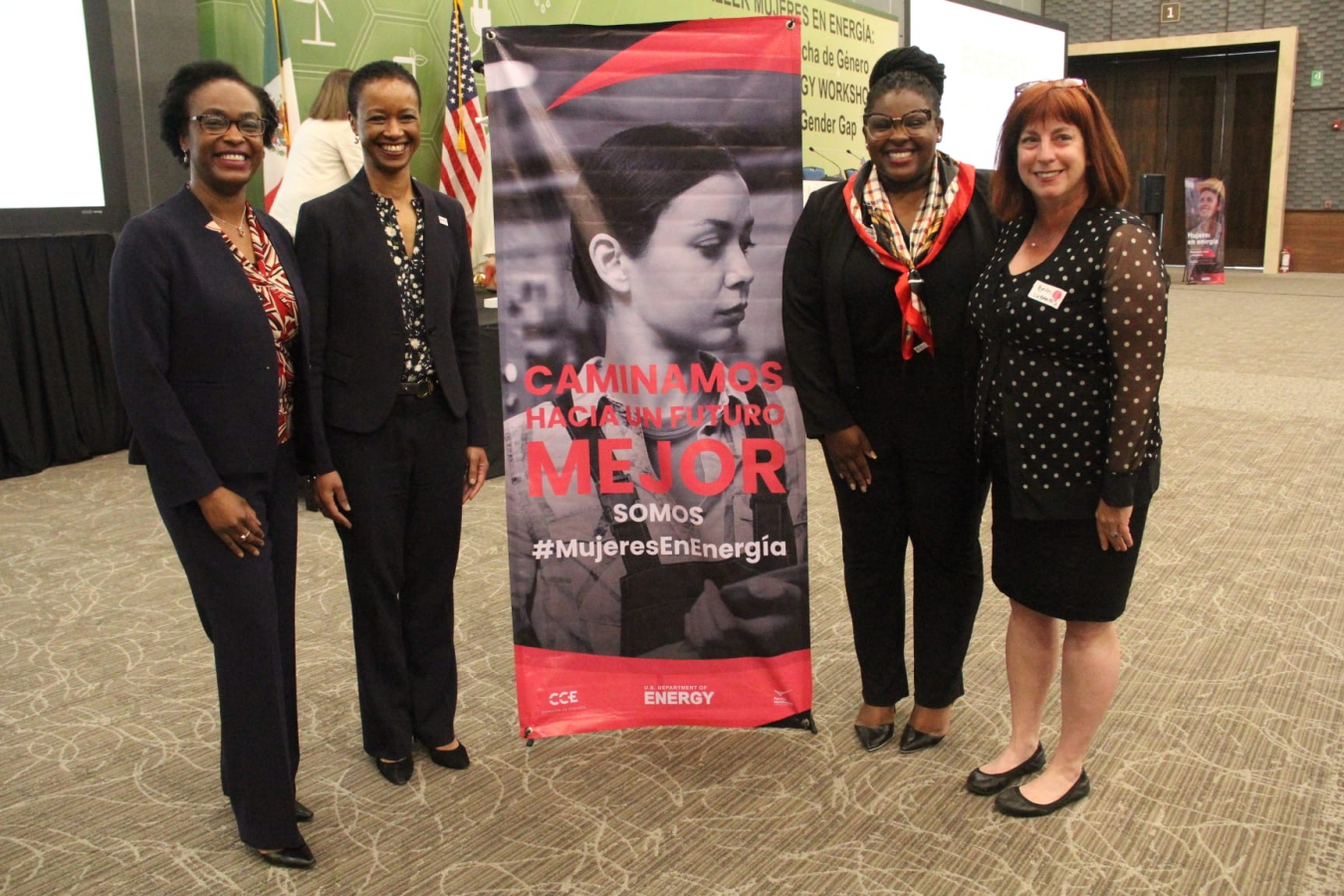Who We Are
The Office of American Affairs guides the Department’s engagement in the Western Hemisphere with partner countries and international organizations. These relationships are crucial to promoting the United States as a valuable energy partner and ensuring the country continues to lead the conversation on the clean energy transition and energy security in the region.
Areas of Focus

U.S.- Argentina
Net Zero World Initiative (NZW):
In November 2021, the U.S. Department of Energy launched the Net Zero World Initiative. The Initiative leverages expertise across U.S. government agencies and U.S. Department of Energy national laboratories for a whole-of-government approach focused on advancing the decarbonization of global energy systems for our partners. Argentina is a founding partner country. The program supports countries committed to raising their climate ambitions through the development of tailored strategies addressing technical clean energy pathways and deployment and investment opportunities that keep net-zero within reach. Activities include designing a national cap-and trade-program, energy system and power sector modeling, expansion of renewable energy, energy efficiency in buildings, carbon capture-utilization-and-storage (CCUS), resource mapping, policy and infrastructure transformation, and finance and investment mobilization.
Clean Energy Transition Accelerator (CETA) Project:
Under the the CETA program, the Pacific Northwest National Laboratory, and the National Renewable Energy Laboratory are providing technical assistance to Argentina in development of national strategies to reduce greenhouse gas emissions and accelerate the clean energy transition.
Energy Security Dialogue (ESD):
The Department of Energy is working with the Department of State under the Energy Security Dialogue (ESD) between the United States and Argentina, which builds upon a robust history of U.S. energy sector technical assistance and cooperation in Argentina.
U.S. - Brazil
U.S.-Brazil Energy Forum (USBEF):
USBEF was created in 2019 as a platform for bilateral energy cooperation to promote trade and investment, advance regional climate goals, and counter malign influence from foreign players. USBEF is co-chaired by the U.S. Secretary of Energy and Brazil Minister of Mines and Energy.
Under the USBEF, the United States and Brazil cooperate on technical, regulatory, and policy issues of mutual interest, identifying concrete objectives for bilateral cooperation, strengthening the role of the private sector, and improving interagency coordination and participation from both countries.
Since its inception, the USBEF has facilitated technical exchanges in several areas, including: a roadmap to support the adoption of natural gas and biomethane into heavy-duty vehicles, with the goal of decreasing Brazil’s dependency of imported fossil diesel; a workshop on cybersecurity and energy emergency management; a workshop on distributed solar regulation and pricing; and a joint project to assess market opportunities for small modular reactors in Brazil.
U.S.-Brazil Clean Energy Industry Dialogue (CEID):
The CEID is a public-private initiative launched in 2022 under USBEF that intends to bring private sector perspectives to bilateral, government-to-government cooperation.
The CEID has five Action Committees focused on areas of mutual interest: 1) clean hydrogen; 2) offshore wind; 3) grid modernization and storage; 4) sustainable fuels; and 5) carbon and methane management.
On October 10th, 2023, U.S. Department of Energy (DOE), U.S. Department of Commerce, and Brazil’s Ministry of Mines and Energy, launched the first Action Committee of the CEID (on Carbon and Methane Management) at an event hosted by the U.S. Chamber of Commerce.
The initial goal of the Carbon and Methane Management Action Committee of the CEID was to promote the exchange of information and best practices on CCUS) pilots and demonstrations.
On February 22nd, 2024, DOE, Commerce, and Brazil’s Ministry of Mines and Energy launched the Clean Hydrogen Action Committee of the CEID in a virtual event hosted by the U.S. Chamber of Commerce.
U.S. -Canada
Bilateral Cooperation:
Collaboration with Natural Resources Canada (NRCAN) in areas including, but not limited to, carbon capture, utilization, and storage (CCUS); critical minerals; nuclear energy; a clean electric grid; clean fuels; energy security; cybersecurity; and sustainable energy for remote and Indigenous communities, including in the Arctic.
In June 2021, DOE and NRCAN updated their Memorandum of Understanding (MOU) on energy cooperation to reinvigorate and expand energy cooperation, identifying 15 areas for bilateral energy cooperation.
Trilateral Cooperation:
Regional cooperation on energy-related issues among the United States, Canada, and Mexico takes place under the rubric of the North American Leaders’ Summit (NALS). At NALS 2023, Leaders committed to 27 deliverables under six pillars: 1) diversity, equity and inclusion; 2) climate change and the environment; 3) competitiveness; 4) migration and development; 5) health; and 6) regional security. DOE leads on deliverables to develop a North American clean hydrogen market and to increase trilateral collaboration to advance nuclear security and safety in North America.
Multilateral Energy Cooperation:
Multilaterally, DOE engages with NRCAN through numerous fora, including, but not limited to, the G7;G20; the International Energy Agency; the Clean Energy Ministerial and Mission Innovation; Asia-Pacific Economic Cooperation; the International Atomic Energy Agency; the International Partnership for Hydrogen and Fuel Cells in the Economy; the International Renewable Energy Agency; the Net-Zero Producers Forum; the Conference on Critical Minerals and Materials; and the Carbon Sequestration Leadership Forum.
U.S. -Chile
Joint Action Plan:
In August 2024, an Action Plan was launched to execute work on our highest priorities stemming from a Memorandum of Cooperation (MOC) signed between both countries. This MOC includes joint activities in seven areas, including early technology adoption, decarbonization, grid modernization, clean hydrogen, Net Zero World, critical minerals, and energy justice.
Net Zero World Initiative:
In November 2021, the U.S. Department of Energy launched the Net Zero World Initiative. The Initiative leverages expertise across U.S. government agencies and U.S. Department of Energy national laboratories for a whole-of-government approach focused on advancing the decarbonization of global energy systems for our partners. Chile is a founding partner country. The program supports countries committed to raising their climate ambitions through the development of tailored strategies addressing technical clean energy pathways and deployment and investment opportunities that keep net-zero within reach. Activities include modeling to inform strategic energy planning, district energy development, power system decarbonization, just transition strategies, and plant repurposing in coal-reliant communities.
U.S. -Mexico
U.S.-Mexico Energy Business Council:
In August 2022, the 10th Meeting of U.S.-Mexico Energy Business Council convened with representatives from the public and private sector of both countries, with input from the private sector on ways to enhance the energy security and economic prosperity of both countries.
Mexico Clean Energy Report:
In April 2022, The National Renewable Energy Lab, with support from the U.S. Department of Energy and U.S. Department of State, published a Mexico Clean Energy Report on Mexico’s potential to become a clean energy powerhouse given its world-class renewable energy potential and low-cost renewable energy generation.
Multilateral Relations
Energy and Climate Partnership of the Americas (ECPA):
In conjunction with the Department of State, represent the United States at the Energy and Climate Partnership of the Americas (ECPA), the only ministerial-level organization in the Western Hemisphere devoted to energy and climate security.
U.S.-Caribbean Partnership to Address the Climate Crisis (PACC) 2030:
Under the PACC 2030 initiative, the U.S. Department of Energy, U.S. Department of State, and the National Renewable Energy Laboratory are supporting Caribbean partners with their clean energy transitions by providing critical technical assistance through the Energy Resilience and Security in the Caribbean Fund.

Women in Energy:
Workforce Development and Closing the Gender Gap in Energy
In April 2022, the Office and Mexico’s Business Coordinating Council co-hosted a conference on “Women in Energy,” a capacity-building exchange aimed to educate women in energy on experiences and best practices to prepare themselves and pursue career advancement.
Empowering Women in Latin America and Caribbean Energy
In May 20-21, 2024, the “Empowering Women in Latin America and Caribbean Energy" conference brought together influential women who are leading the charge in energy innovation and sustainability, who showcased the latest advancements in renewable energy technologies.
Recent Highlights
- Deputy Secretary of Energy David Turk traveled to South America in March 2023 to highlight the strong bilateral and multilateral cooperation between the United States and Brazil, Chile, and Argentina. Click here for a readout from the trip.
- The Office supported a recent mission to Chile and Argentina under the Net Zero World (NZW) Initiative, in which the two countries are founding members. The mission assessed the cooperation to-date on NZW and identified the areas of focus for future efforts.

